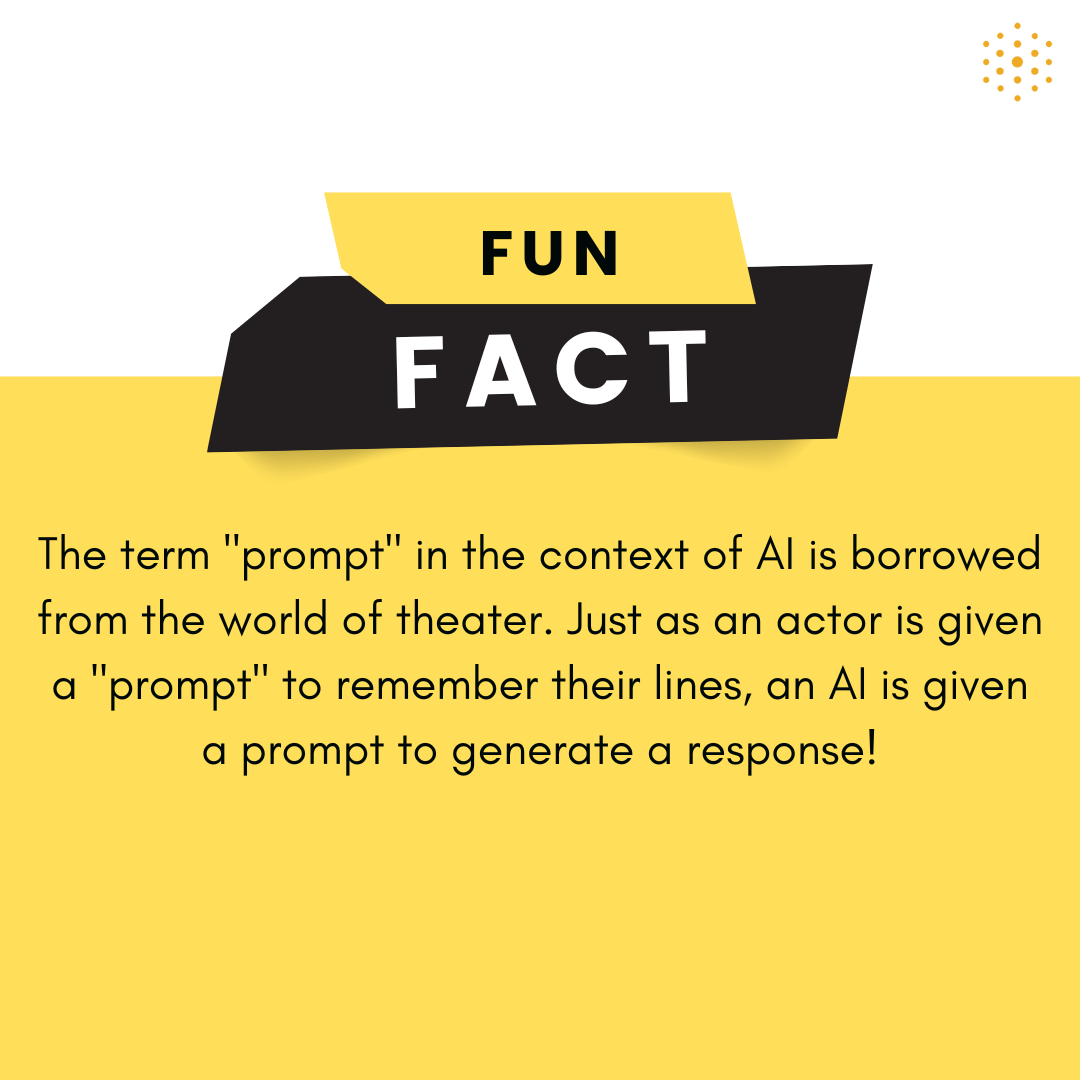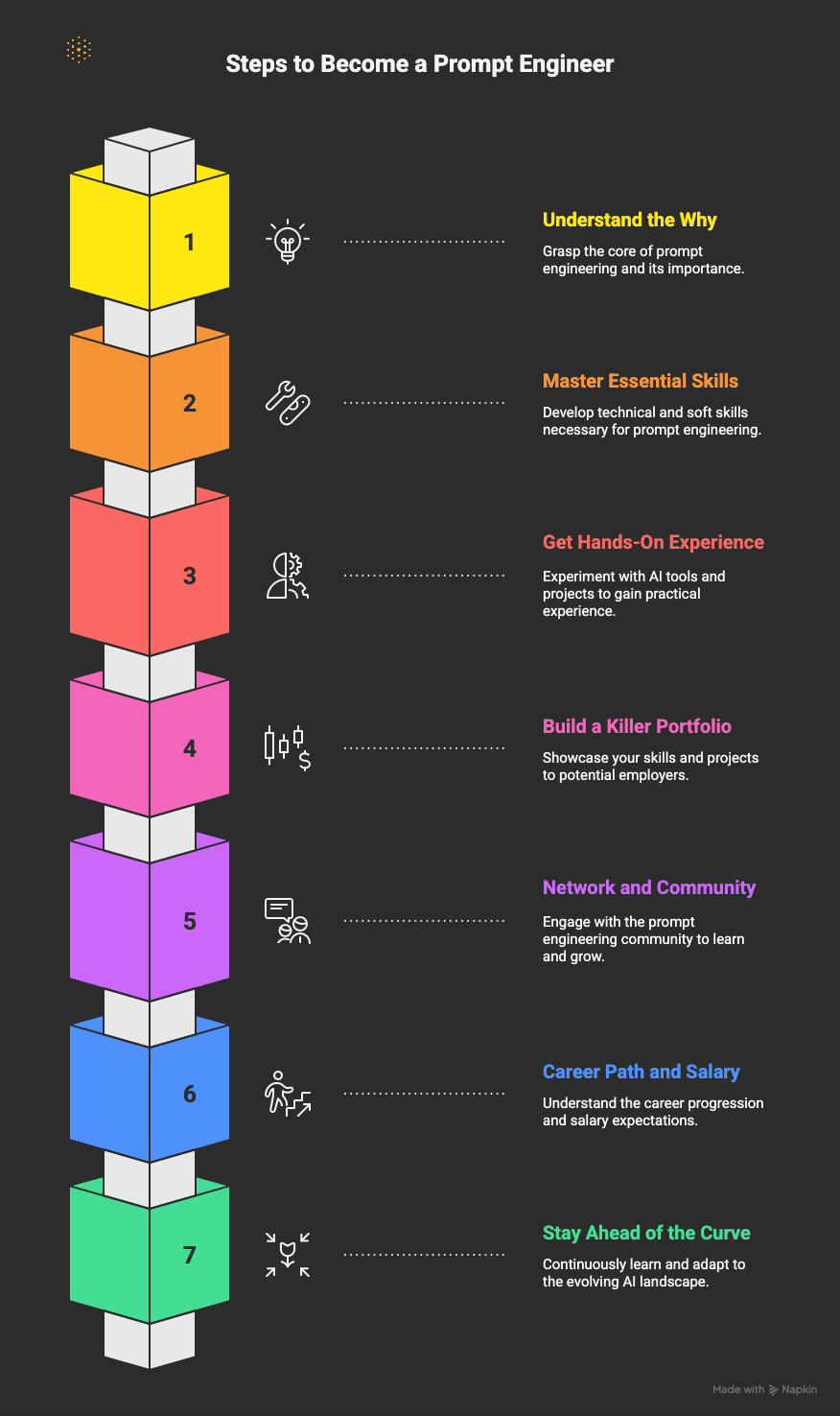How can you build a successful career as a prompt engineer in 2025?
Becoming a prompt engineer requires mastering the art of communicating with AI — understanding how large language models think, crafting structured prompts, and iterating based on feedback. To stand out, focus on hands-on experimentation, build a strong portfolio, learn the basics of Python and AI concepts, and stay engaged with prompt engineering communities to keep your skills relevant as the field evolves.
The world of Artificial Intelligence is moving at lightning speed, and with it, a whole new set of career opportunities are popping up.
One of the most talked-about roles right now is the Prompt Engineer.
Far from being a passing buzzword, prompt engineering is becoming a core discipline in how humans interact with large language models (LLMs) like GPT, Gemini, and Claude.
The numbers tell the story: the global prompt engineering market is projected to hit $6.5 trillion by 2034, growing at an eye-popping 32.9% CAGR from 2025 to 2034 according to Precedence Research.
And that kind of growth signals more than hype, it marks a long-term transformation.
So, if you're ready to move beyond the basics and learn what it really takes to become a prompt engineer, you're in the right place.
1. Understand the "Why": The Core of Prompt Engineering
Before you dive into the "how," you need to grasp the "why."
At its core, prompt engineering is the art and science of communicating effectively with AI.
It's about crafting the perfect prompts to get the desired output from Large Language Models (LLMs) like GPT and Gemini.
This isn’t just about asking questions; it's about structuring your instructions in a way that the AI can understand and execute flawlessly.
Think of yourself as a translator between human language and AI language.
You're not just giving commands; you're guiding the AI's "thought process" to generate the most accurate, relevant, and creative responses.
A well-crafted prompt can be the difference between a generic, unhelpful answer and a brilliant, insightful one.
Also Read: How to become a ML Engineer?

2. Master the Essential Skills (It's Not Just About Coding)
While a technical background can be helpful, you don't need to be a coding genius to become a prompt engineer. The most successful prompt engineers have a unique blend of technical and soft skills.
Technical Skills
- Understanding of AI and Machine Learning Concepts: You don't need to build your own LLM, but you do need to understand the fundamentals of how they work. Concepts like natural language processing (NLP), deep learning, and transformer models are crucial.
- Proficiency in Python: Python is the go-to language for AI and machine learning. While not always a strict requirement, knowing Python will give you a significant edge, especially for more advanced roles. Many companies look for candidates who can not only write prompts but also integrate them into larger systems using Python.
- Familiarity with Different LLMs: Don't just stick to one model. Experiment with various LLMs like OpenAI's GPT series, Google's Gemini, and Anthropic's Claude. Each has its own strengths, weaknesses, and nuances. Understanding these differences will make you a more versatile and effective prompt engineer.
Soft Skills
- Creativity and Critical Thinking: This is where the "art" of prompt engineering comes in. You need to be able to think outside the box and come up with creative ways to phrase your prompts to get the best results.
- Strong Communication Skills: You'll be working with developers, product managers, and other stakeholders to understand their needs and translate them into effective prompts. Clear and concise communication is key.
- Problem-Solving Abilities: Often, your first prompt won't be your best. You need to be able to analyze the AI's output, identify where it went wrong, and iterate on your prompt to improve the results.
3. Get Hands-On Experience: Learn by Doing
Reading about prompt engineering is one thing, but the real learning happens when you start experimenting.
- Start with the Basics: Use free tools like ChatGPT, Gemini, and Claude to get a feel for how different prompts affect the output. Try to accomplish specific tasks, like writing a poem, summarizing a complex article, or generating code.
- Take Online Courses: There are many excellent online courses that can teach you the fundamentals of prompt engineering. Coursera offers a "Generative AI: Prompt Engineering Basics" course by IBM, and websites like Learn Prompting have a wealth of free resources.
- Work on Personal Projects: This is one of the best ways to build your skills and create a portfolio. Choose a project that interests you and use prompt engineering to solve a real-world problem. For example, you could build a chatbot for your personal website or create a tool that generates social media content.
4. Build a Killer Portfolio
A strong portfolio is your best asset when applying for prompt engineering jobs. It's not enough to say you're good at writing prompts; you need to show it.
Your portfolio should showcase a variety of projects that demonstrate your skills. For each project, include:
- The Problem: What was the goal of the project?
- Your Process: How did you approach the problem? What prompts did you use? How did you iterate on your prompts to improve the results?
- The Outcome: What was the final output? How did it solve the problem?
Include a link to your portfolio on your resume and LinkedIn profile. This will make it easy for recruiters and hiring managers to see your work. Remember, a well-structured and detailed portfolio can make you stand out from other candidates.
5. Network and Get Involved in the Community
The field of prompt engineering is still relatively new, which means the community is tight-knit and eager to share knowledge.
- Join Online Communities: Participate in forums, Discord servers, and LinkedIn groups dedicated to prompt engineering. For example, the Learn Prompting Discord (45K+ members) offers courses and Q&A sessions, while FlowGPT and CivitAI host active communities for sharing and critiquing prompts. These communities are great ways to learn from others, ask questions, and stay up-to-date on the latest trends.
- Attend Webinars and Conferences: Many organizations host online and in-person events focused on AI and prompt engineering. For example, NeurIPS, ICLR, and ACL often feature workshops on large language models and prompting; and community-driven meetups such as AI Engineer World’s Fair provides hands-on networking opportunities. These are excellent ways to learn from experts and connect with other professionals in the field.
- Contribute to Open-Source Projects: If you have coding skills, contributing to open-source AI projects is a fantastic way to gain experience and make a name for yourself in the community.

6. Understand the Career Path and Salary Expectations
Prompt engineering is not just a job; it's a career path with significant growth potential.
- Entry-Level Roles: As a junior prompt engineer, you'll focus on writing and testing prompts for specific applications.
- Mid-Level Roles: With experience, you'll take on more responsibility, such as developing prompt engineering strategies and mentoring junior engineers.
- Senior-Level Roles: Senior prompt engineers often lead teams, work on complex projects, and contribute to the overall AI strategy of a company.
In the US, the average base salary of a prompt engineer is $126,398, which can vary depending on experience, location, and company.
7. Stay Ahead of the Curve: The Future of Prompt Engineering
The world of AI is constantly evolving, and the role of the prompt engineer will evolve with it. To stay relevant, you need to be a lifelong learner.
Some experts believe that as AI models become more sophisticated, the need for intricate prompt engineering will decrease.
However, others argue that the role of the prompt engineer will become even more critical as we find new and more complex ways to use AI.
Baidu founder Robin Li famously stated, “In 10 years, half of the world's jobs will be in prompt engineering, and those who cannot write prompts will be obsolete.”, as reported by Medium.
The key will be to adapt and evolve your skills as the technology changes. Stay curious, keep experimenting, and never stop learning.
Also Read: 5 step guide to career growth roadmap in tech industry.
Wrapping Up
The rise of prompt engineering shows just how quickly the career landscape is changing, and how valuable it is to stay ahead of the curve.
Whether you’re learning the fundamentals, building a portfolio, or networking within the AI community, the key is consistency and adaptability.
At Hiration, we believe the same principle applies to every career path: the right guidance and smart use of AI can unlock opportunities that once felt out of reach.
From resumes and interviews to LinkedIn optimization, we help people navigate their next career move with confidence.
The future of work belongs to those ready to embrace change. Start building the skills today that will keep you relevant tomorrow.
Prompt Engineering — FAQ
What does a prompt engineer do?
A prompt engineer crafts and refines instructions (prompts) that guide large language models like GPT or Gemini to generate accurate, useful, and creative outputs.
Do I need coding experience to become a prompt engineer?
No. While Python and AI familiarity help, strong analytical thinking, creativity, and communication skills are often more important than programming knowledge.
What are the core skills needed for prompt engineering?
Key skills include an understanding of AI concepts, natural language processing, data analysis, creativity, problem-solving, and the ability to write clear, structured instructions.
How can I practice prompt engineering?
Experiment with tools like ChatGPT, Gemini, or Claude. Try solving specific tasks, analyze the model’s responses, and iteratively refine your prompts to improve results.
What should a prompt engineering portfolio include?
Showcase real-world examples—your goal, the prompts you designed, iterations made, and final outcomes that demonstrate measurable impact or creativity.
Where can I learn prompt engineering?
Free and paid options include IBM’s “Generative AI: Prompt Engineering Basics” on Coursera and community resources like Learn Prompting and FlowGPT.
How can I connect with other prompt engineers?
Join online groups such as the Learn Prompting Discord, FlowGPT, or CivitAI to exchange ideas, get feedback, and stay updated on the latest techniques.
What is the salary range for prompt engineers?
In the U.S., prompt engineers typically earn around $120,000–$150,000 annually, depending on experience, technical expertise, and industry.
What’s the future of prompt engineering?
As AI systems advance, prompt engineers will play a larger role in building workflows, testing model behavior, and shaping human–AI collaboration frameworks.



